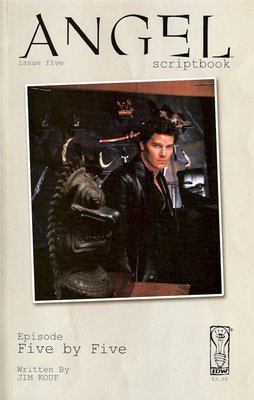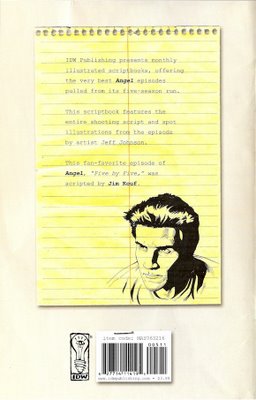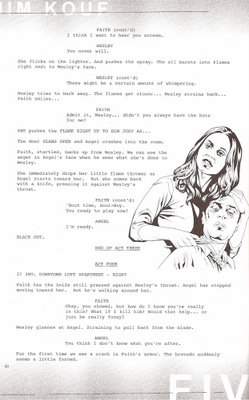 Last week over at Alligators on a Helicopter, Scott the Reader posted a story about his days as an addict of sorts, buying screenplays from his "script pusher" in Manhattan. This led to a discussion in his Comments section about what scripts people own, how they acquired them, and why. Which got me to thinking about my own collection of scripts, many of which I acquired long before I had any intention of being a screenwriter.
Last week over at Alligators on a Helicopter, Scott the Reader posted a story about his days as an addict of sorts, buying screenplays from his "script pusher" in Manhattan. This led to a discussion in his Comments section about what scripts people own, how they acquired them, and why. Which got me to thinking about my own collection of scripts, many of which I acquired long before I had any intention of being a screenwriter.I got started in the late 80s or early 90s, picking up overpriced, zillionth-generation xeroxes of screenplays at comic conventions. All of them were from genre movies -- science fiction, horror, comic book adaptations --and most were selected for their "special features," such as scenes that ended up on the cutting room floor or were never filmed at all. Other screenplays I picked up because they were for movies or sequels that never made it out of development hell.
For example, the 3rd draft of Sam Hamm's screenplay for Tim Burton's Batman still included Robin's origin. The screenplay for Terminator 2 had a definitive (and superior) ending, rather than the vague and open-ended (sequel-friendly) one that Cameron went with. And since Buckaroo Banzai was already one of my all-time favorite films, I had to see if there was any brilliant weirdness in the script that might not have made it onto the screen.
Then of course there was Sam Hamm's screenplay for the proposed Watchmen movie (written long before Alan Moore asked to have his name removed from the credits of all movies and graphic novels that he doesn't own the rights to), and the uncredited script for Lost Boys 2.
 I also picked up a few treatments, such as George Lucas's "The Star Wars" from 1973, in which Luke Skywalker is a general in the 33rd century, and Fall of the Republic, John L. Flynn's version of Star Wars: Episode III from 1983. And shortly before the series premiere of Star Trek: Deep Space Nine, I acquired the "Writers/Directors Guide" and a booklet on "Initial Concepts for Staff Writers." And speaking of Star Trek, somewhere along the way I ended up with screenplays for episodes from the original series: "The Naked Time" and "The Changeling." (If the person I got those from is reading this, and those were a loan rather than a gift, and you've been wondering where they've been for the last 10-20 years... well, now you know).
I also picked up a few treatments, such as George Lucas's "The Star Wars" from 1973, in which Luke Skywalker is a general in the 33rd century, and Fall of the Republic, John L. Flynn's version of Star Wars: Episode III from 1983. And shortly before the series premiere of Star Trek: Deep Space Nine, I acquired the "Writers/Directors Guide" and a booklet on "Initial Concepts for Staff Writers." And speaking of Star Trek, somewhere along the way I ended up with screenplays for episodes from the original series: "The Naked Time" and "The Changeling." (If the person I got those from is reading this, and those were a loan rather than a gift, and you've been wondering where they've been for the last 10-20 years... well, now you know).After I became interested in writing screenplays myself, I discovered that I still owned a paperback copy of The Fisher King: The Book of the Film, another relic from my heavy collecting days. I remember ordering it sight unseen, based solely on my love of the movie. Reading Richard LaGravanese's screenplay, I realized a few things: It is extremely good (one of the best I've ever read, actually, and strong enough to get Terry Gilliam to break his vows to never again direct someone else's script or work in Hollywood); I could, obviously, learn a lot from studying it; and finally, that I really prefer reading scripts that have been published in book form to xeroxed pages held together by brads. The text is more aesthetically pleasing and easier on the eyes.
I still go to the occasional comic con, but I don't bother with the tables of screenplays. For me, they're just one more casualty of the internet, where I know I can find the same scripts for free on websites like Drew's Script-O-Rama, The Weekly Script, Simply Scripts, IMSDb, TWIZ TV, and numerous others. But because reading scripts on a computer screen has its own set of drawbacks, I still prefer reading them in book form. And they look cool on my bookshelf. Other favorites besides The Fisher King include Bubba Ho-Tep (with Don Coscarelli's screenplay, Joe R. Lansdale's original short story, plus introductions by both of them); The Donnie Darko Book (which includes the screenplay by Richard Kelly, an intro by Jake Gyllenhaal, a Richard Kelly interview, lots of artwork, and pages from The Philosophy of Time Travel); and Men In Black: The Script and the Story Behind the Film (a big, glossy, full-color affair with lots of photos, Ed Solomon's script, and an official MIB Agents' Manual). The cost of these film books can add up quickly, though, so whenever I'm ready for another batch, I search for used copies on Half.com.
 And since returning to comics retail, I've discovered that comic shops are also good sources of screenplays. My copy of Kevin Smith's Clerks II: The Screenplay came from Paper Heroes, for example. But more to the point:
And since returning to comics retail, I've discovered that comic shops are also good sources of screenplays. My copy of Kevin Smith's Clerks II: The Screenplay came from Paper Heroes, for example. But more to the point:IDW Publishing, the publisher of the Angel comic books, also publishes Angel "scriptbooks"... screenplays from popular episodes of Joss Whedon's TV series in comic book format, with illustrations by artist Jeff Johnson.
I've got Angel: Scriptbook #5, which is appropriately enough the issue that contains Jim Kouf's script for the episode "Five by Five." You know, the one where Faith, the rogue vampire slayer, shows up in Los Angeles and tortures Wesley. Good times, good times. (Nothing against Wes, mind you, it's just that Faith is one of my all-time favorite television characters).
Other issues include the scripts for the pilot ("City of"), "Spin the Bottle", "Waiting in the Wings", and "Sanctuary". And in November, IDW will be reprinting five of them in the Angel Scriptbook Collection: Volume 1, with a second volume to follow in March.
I'm not sure whether the intended target audience for books (or comic books) of screenplays is primarily fans or screenwriters, but either way, they're an extremely handy (and collectible) resource.
2 comments:
What's a spec monkey?
A spec monkey is a screenwriter who writes scripts "on spec" (in other words, "made, built, or done with hopes of but no assurance of payment or a sale; without commitment by a client or buyer"... thank you, Dictionary.com). The monkey part can either refer to the fact that we, like our fellow humans, are primates ("Laugh while you can, monkey boy!" -- John Bigboote, "The Adventures of Buckaroo Banzai Across the 8th Dimension") or the infinite monkey theorem, which states (more or less) that an infinite number of monkeys typing away on an infinite number of keyboards for eternity will eventually produce the works of Shakespeare... statistically speaking.
Applying the infinite monkey theory to screenwriting, I think the implicit hope is that an infinite number of spec monkeys will eventually produce a decent movie, or at least a marketable script.
Either way, it sounds better than "aspiring screenwriter."
Post a Comment